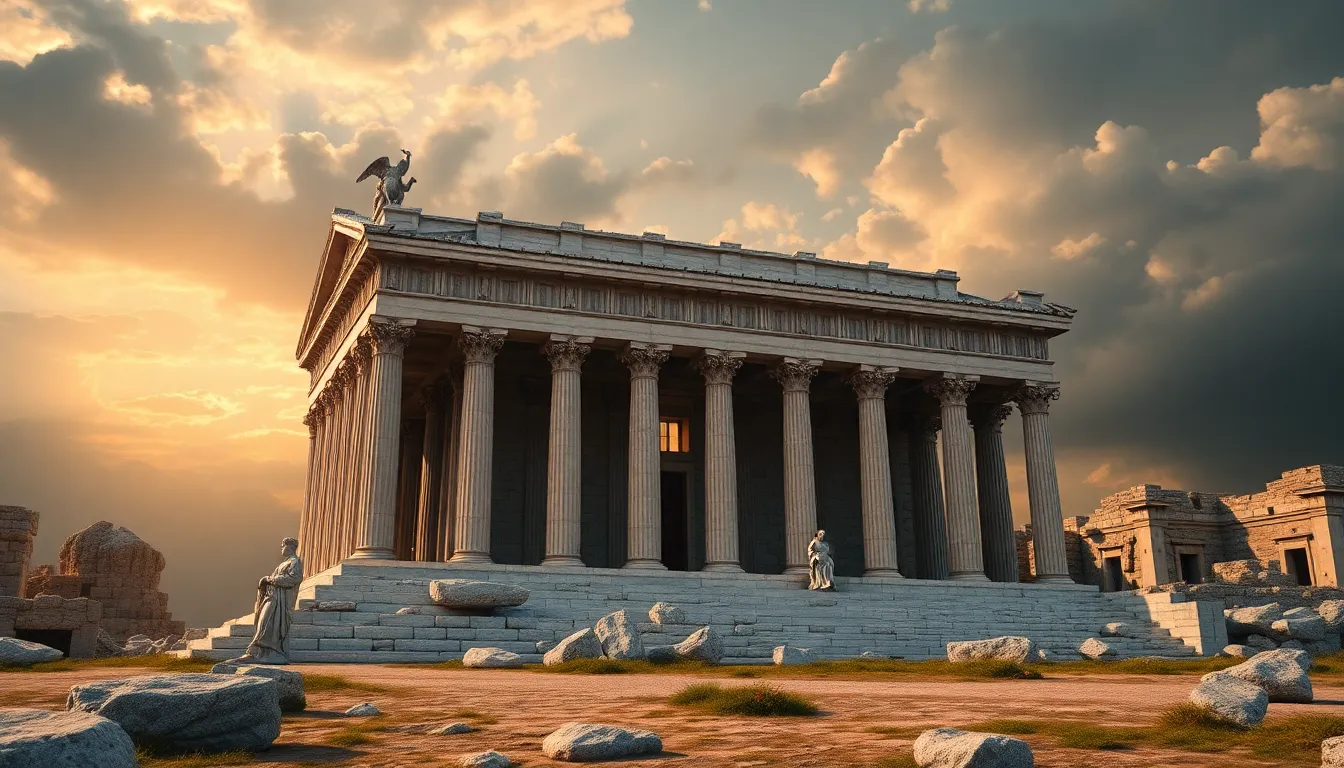The Greek Pantheon: A Study of Divine Hierarchy and Power Dynamics
I. Introduction
The Greek Pantheon refers to the collection of deities worshiped in ancient Greece, each embodying various aspects of life, nature, and the human experience. This intricate system of gods and goddesses displays a complex hierarchy that reflects both the cultural values of the time and the existential questions faced by humanity.
The divine hierarchy in Greek mythology is crucial for understanding how the ancient Greeks perceived the universe and their place within it. The relationships, conflicts, and power dynamics among the gods reveal much about the societal structure and the human condition.
This article focuses on the power dynamics within the Greek Pantheon, exploring the roles and relationships of both major and minor deities and their interactions with mortals.
II. The Olympian Gods: Rulers of the Pantheon
The Olympian gods, residing atop Mount Olympus, are the principal deities in Greek mythology, reigning over various aspects of life and nature. Key figures among the Olympians include:
- Zeus – King of the gods, god of the sky and thunder.
- Hera – Queen of the gods, goddess of marriage and family.
- Poseidon – God of the sea, earthquakes, and horses.
- Athena – Goddess of wisdom, war, and craft.
- Ares – God of war.
The concept of supremacy among the Olympians is marked by Zeus’s rule, but authority is often challenged, revealing a dynamic interplay of power. Zeus, despite being the foremost deity, must navigate relationships with other gods, often negotiating alliances and rivalries.
Fate and prophecy play pivotal roles in divine governance, as foreseen events can dictate the actions and decisions of the gods. This interplay of fate and free will adds depth to the narrative of Greek mythology, illustrating the limitations even divine beings face.
III. The Titans: Predecessors to the Olympians
The Titans were the original deities who ruled during the Golden Age before the rise of the Olympians. Key figures among the Titans include:
- Cronus – Leader of the Titans, associated with time and harvest.
- Rhea – Mother of the Olympians, goddess of fertility and motherhood.
- Oceanus – Titan god of the ocean.
The Titanomachy, a great conflict between the Titans and the Olympians, marked a significant transition in divine authority. This battle concluded with the defeat of the Titans, leading to their imprisonment and the establishment of the Olympians as the ruling pantheon.
Despite their defeat, the influence of the Titans persists in myths and cultural references, serving as reminders of the cyclical nature of power and the potential for rebellion against the established order.
IV. The Role of Lesser Deities in the Hierarchy
Beyond the major gods, the Greek Pantheon includes numerous lesser deities, such as nature gods, nymphs, and personifications of concepts. These figures, while not as prominent as the Olympians, play essential roles within the broader pantheon:
- Nymphs – Spirits of nature, often associated with particular locations such as rivers, trees, or mountains.
- Personifications – Deities representing abstract concepts like Nike (Victory), Eros (Love), and Thanatos (Death).
Lesser deities often influence mortal lives directly, embodying the natural world and its phenomena. For instance, the river god Achelous represents the waters that nourish the land, while Demeter, the goddess of harvest, illustrates the connection between divine influence and agricultural prosperity.
V. Gender Dynamics within the Pantheon
The Greek Pantheon exhibits a complex interplay of gender dynamics, with male and female deities often in contention for power and influence. The relationships among these deities reflect societal views on gender roles and authority:
- Female Deities: Goddesses like Athena, Artemis, and Demeter possess significant power and autonomy, often challenging patriarchal norms.
- Male Deities: Gods like Zeus and Ares embody traditional masculine traits, often asserting dominance over their female counterparts.
Case studies such as Athena’s wisdom versus Ares’s chaotic nature highlight how gender dynamics manifest in power struggles. Athena’s strategic warfare contrasts sharply with Ares’s brute force, revealing the complexities of gendered power in the pantheon.
VI. The Influence of Mortals on Divine Power
Mortals, particularly heroes and demigods, play a crucial role in the Greek Pantheon, acting as mediators between the divine and human realms. Their interactions with gods significantly influence divine status and power:
- Heroes: Figures like Heracles and Perseus often receive divine favor, enhancing the gods’ prestige through their exploits.
- Worship: Rituals and sacrifices by mortals can elevate a god’s status, reflecting the reciprocal nature of divine and mortal relationships.
Myths such as the tale of Odysseus illustrate how mortal actions can impact divine favor and the overall balance of power among the gods, emphasizing the interconnectedness of the pantheon and humanity.
VII. Symbols and Attributes of Power in Greek Mythology
Symbols and attributes associated with the gods are vital in understanding their power dynamics. These sacred symbols often reflect the deity’s domain and authority:
- Zeus: The thunderbolt, symbolizing his control over the sky and weather.
- Athena: The owl, representing wisdom and vigilance.
- Poseidon: The trident, symbolizing his dominion over the seas.
Temples and religious practices dedicated to these deities underscore their significance in ancient Greek culture. Iconography often illustrates the relationships and hierarchies among the gods, showcasing their power and influence in the mortal world.
VIII. Conclusion
In summary, the exploration of the Greek Pantheon reveals a rich tapestry of divine hierarchy and power dynamics. The relationships among the Olympians, Titans, and lesser deities illustrate the complexities of authority and influence in ancient Greek mythology. These narratives not only reflect the cultural values of the time but also resonate in contemporary society, influencing modern literature, art, and psychology.
The lasting impact of the Greek Pantheon continues to inspire and inform, reminding us of the enduring relevance of mythology in understanding human nature and the complexities of power.




